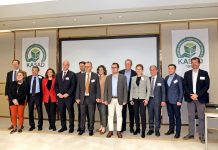Mumbai-based Akar has evolved from being a printer to a well-established printing and publishing company in the last four decades. Akar meets the demands of pharma companies, publishers, corporates, institutions and public sector undertakings (PSUs).
The company is ISO-certified and has an approximately 30,000 square feet factory and a 15,000 square feet warehouse at its plant in Silvassa. Being a one-stop printing solution enables Akar to deliver large orders. Akar has manufactured more than 1,000 innovative products for pharmaceutical companies. Ruhan Hansuka, executive director of Akar, says, “ISO certification for paper-based promotional products is a unique certification. This certification has helped our organization to reach a high level in terms of learning and improving. We believe even the best can get better. Hence, we adhere to a well- documented procedure and performance benchmarks with continuous re-inspection and improvement of our processes. Embracing ISO standards has allowed us to achieve better performance. Cross training ensures consistent performance from all team members. Documented procedures promote reliability and corrective actions reduce mistakes. Today we are able to get more orders which has improved our bottom line.”
Akar has installed the 2-color KBA Rapida 74 perfecting machine, specifically for printing pharma books that runs into several lakhs. This machine is equipped with auto perfecting and runs at a very high speed of 12,000 sheets an hour. Auto perfecting can be controlled from the console unlike the manual intervention required for job changes in other perfecting machines available in the market, thus allowing a quick job changeover.
Recently the company has also installed second-hand KBA Rapida 74s and Rapida 104 presses at the Silvassa plant. Hansuka says, “Our Silvassa plant is equipped with imported machinery from German and Japanese manufacturers to ensure high standards of printing from the first sheet to end of the print run. We have installed the 2003 model of KBA Rapida 74s and Rapida 104 presses at our plant in Silvassa. The KBA Rapida 104 was purchased in order to meet the demands of the printing needs of our core business of print-based promotional products, which were previously printed on two machines. With the Rapida 104 we are able to print jobs at a high speed and achieve on-time delivery of products.
“Nowadays, packaging has become an important part of brand identity. In packaging we produce jobs such as printed paper and PP cartons. We want to develop our services in speciality packaging for the pharma division. With the increase in production, we might add a 6-color KBA Rapida-106 coater UV press in the near future,” concludes Hansuka.











